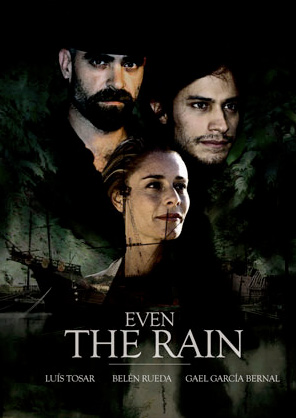
According to Iciar Bollain’s newest film Even The Rain we are a petty, selfish society prone to acts of greed. Also, this petty, selfish, terrible behavior isn’t a newly discovered way of living, it’s been happening for decades. Even worse, all of us, every single free-thinking individual on the planet knows this and is actively or inactively a part of it each and every day of our lives. To think that Iciar Bollain would even need to make another film that addresses this point seems redundant, but Bollain is a director of exceptional skill and manages to weave together hundreds of years of oppression and revolution in to a story both epic and extremely personal.
Even The
Rain revolves around the making of a Spanish film about
Christopher Columbus and the priests who fought his special
brand of colonialism. Looking for cheap locations and
cheaper extras, director Sebastian (Gael Garcia Bernal) and
his borderline unscrupulous producer Costa (Luis Tosar) have
chosen Bolivia as the site of their picture. Unfortunately,
the town is on the brink of revolution over the water rights
owned by major corporations and their lead Daniel (the
stunningly unique Juan Carlos Aduviri) is at the forefront
of the rabble-rousing. Jumping back and forth between the
film Sebastian is filming and the actual revolution occuring,
Iciar is able to draw the parallels of the forefathers of
colonialism with the acrid stench of modern societies
equivalent errors. Its a beautiful decision as she never
announces a change between filming and not filming, thus the
two worlds and their awful similarities bleed in to one
another, creating a portrait of how deeply integrated
oppression has become.
|
